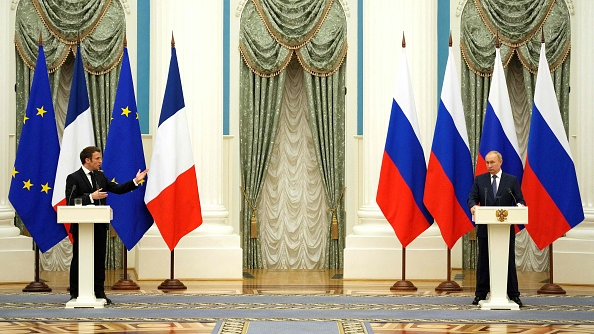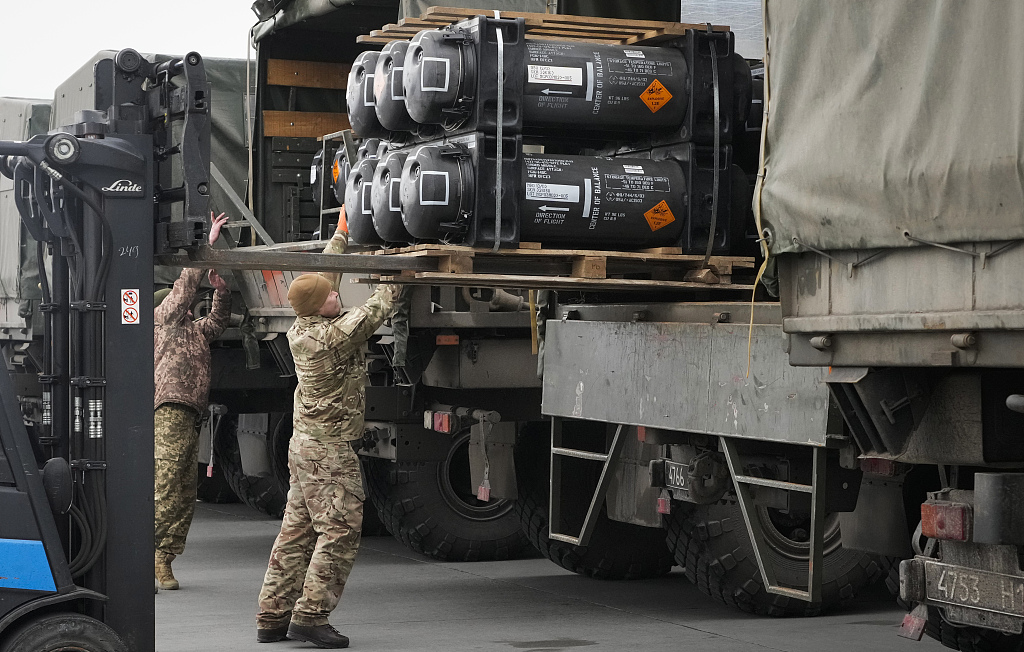
Russian President Vladimir Putin (R) listens during a joint press conference with French President Emmanuel Macron in Moscow, February 7, 2022. /Getty
Russian President Vladimir Putin (R) listens during a joint press conference with French President Emmanuel Macron in Moscow, February 7, 2022. /Getty
Editor's note: Stephen Ndegwa is a Nairobi-based communication expert, lecturer-scholar at the United States International University-Africa, author and international affairs columnist. The article reflects the author's opinions and not necessarily the views of CGTN.
The unfolding events on the Russia-Ukraine border have raised the geopolitical temperatures in recent weeks. For obvious reasons, and even some that may not be apparent, the West is on Russia's case, threatening and cajoling President Vladimir Putin on his alleged intention to attack and annex its western neighbor.
The spirited shuttle and telephone diplomatic efforts with Russia, Ukraine and other players around the tension are yet to bring a semblance of conciliation on the matter. What is emerging, however, is the fact that there is a hidden ideological and political dichotomy in the approach on the matter pitting the United States on one hand, and Europe on the other.
Experts who have analyzed the current scenario so far hold the view that Europe has toned down its rhetoric as expressed through French President Emmanuel Macron's body language, while the U.S. has retained its belligerence as President Joe Biden continues beating the drums of war. It is instructive that the U.S. is also inciting other countries to ship their citizens out of Ukraine, even as President Volodymyr Zelensky recently stated that a Russian invasion is unlikely.
The recent shuttle diplomacy by Macron in Moscow and Kyiv seemed to bring light at the end of the tunnel on this matter. The tripartite but separate in person meetings and phone conversations brought out the real issues. At the core of the Macron-Putin talks is a search of ways of moving ahead on the implementation of the 2015 Minsk Agreement between Kyiv and Moscow, otherwise known as Minsk II agreement, and Europe's overall security and stability.
Macron pleaded for the revisiting of the France and Germany brokered Minsk agreements, which seek to end the war in eastern Ukraine, as the blueprint to peace between the two neighbors. Macron felt a personal obligation to follow through the treaties, seeing that Germany has been taken hostage by the U.S. in its usual divisive strategy. Sadly, at the same time Macron was talking compromise while meeting Putin and Zelensky, Biden was threatening to cut off Nord Stream 2 gas pipeline which runs between Russia and Germany.

Ukrainian servicemen load Javelin anti-tank missiles, delivered as part of the U.S. security assistance to Ukraine, into military trucks at Boryspil airport outside Kyiv, Ukraine, February 11, 2022. /CFP
Ukrainian servicemen load Javelin anti-tank missiles, delivered as part of the U.S. security assistance to Ukraine, into military trucks at Boryspil airport outside Kyiv, Ukraine, February 11, 2022. /CFP
This was preposterous and condescending toward the top U.S. ally in Europe. But Germany finds it tough to contradict the U.S. even though it likely has the feeling that the latter is misrepresenting its interests for selfish objectives. Such threats and provocation also risk rolling back any budding rapprochement in this fluid matter. It is clear that Biden underestimates Russia's power and resolve to pursue its plans to their logical conclusion. Biden's maxim in this crisis is "my way or the highway," a dictum that Moscow cannot countenance.
The meeting between Putin and Macron shows that the former does not have an entrenched position and is ready to dialogue with reasonable and respectful parties. Having struck a rapport with Putin, the West needs to seize this opportunity and their dialogue. Macron has read Putin's mind and understands Russia's need for reassurance concerning the risk of an encroaching North Atlantic Treaty Organization.
While Macron has expressed optimism that an amiable solution to the conflict is possible, on February 12 Biden warned that the U.S. will react "decisively and impose swift and severe costs" in case Russia goes ahead with the invasion. This is the kind of toxic language and negative attitude that could actually stoke the fire. This attitude is characteristic of Biden's ideological high horse.
Now, although Macron's diplomatic overtures are yet to meet Putin's irreducible minimums, they validate Russia's concerns and express a willingness to have flexibility on the issue. But the French president is also concerned about the future of Europe, as evidenced by his change from the Socialist Party to campaign under La République En Marche!, a centrist and pro-European party he founded in April 2016.
The age difference between Macron and Biden also shows their outlook to the future. As the youngest president ever, the French leader looks at a great future ahead for Europe but which can only be possible through peace and mutual understanding between nations. Conversely, as the oldest U.S. president ever to be elected, Biden is aware that time is of the essence, particularly since a second term is not assured. He sees his mission as one of entrenching America's hegemony by all means necessary.
In contradiction of the U.S.'s hype, Kyiv has said that it does not find any imminent threat of invasion from Russia. This is the standpoint on which Macron is operating from in his apparent optimism in resolving the crisis. It is a personal conviction as he is currently operating alone and not under the auspices of the European Union (EU). The U.S. has crowded out the role of the EU, leaving the latter in a quandary whether to use the Macron level headed approach or leave the superpower to use its arm twisting and abrasive scare tactics.
(If you want to contribute and have specific expertise, please contact us at opinions@cgtn.com.)

